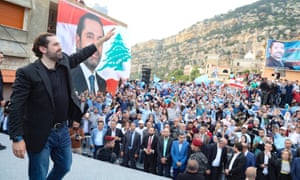Nine years and two collapsed governments since the last election, Lebanon goes to the polls on Sunday with leaders touting a new beginning for a country bedevilled by debt and dysfunction, but voters fearing more of the same.
The long-awaited parliamentary election had been hailed as a potential turning point for a state beset by decades of war, a turbulent domestic scene and a neighbouring crisis that has posed new threats.
As polling day has drawn nearer, however, it has become increasingly likely that the result will reaffirm the status quo of a powerful, elite-run patronage network with entrenched channels of influence.
For opponents of prime minister Saad Hariri’s government, this spells trouble. “The country is going through serious social, economic and political challenges that will translate into disastrous consequences if the same elite runs the country, with the same mindset that it did the last 30 years,” said Gilbert Doumit, a candidate in Beirut for a new list, Kulna Watani.
A complicated electoral law drafted for the vote was supposed to give more room for plurality and merit-based candidates to emerge in a political scene that has taken root around civil war-era former warlords and sectarian leaders. Established political blocs, however, rather than newcomers, look set to benefit from the high threshold required to win a seat.
The result could continue to marginalise candidates standing on civil society platforms. One such campaign, Beirut Madinati, emerged during municipal elections three years ago but has since made little impact away from the capital. Lebanon’s large working class population remains wedded to the traditional structures, analysts say.
That means a showdown, in some form, between two rival blocs that emerged after the assassination of the former prime minister Rafiq Hariri in February 2005. Dubbed March 8 – a pro-Syria and Hezbollah movement – and March 14 – a pro-western counterpart – the two movements have dominated Lebanese politics ever since.
March 14 was briefly ascendant until 2008, despite more than a dozen of its loyalists, including MPs, journalists, and security officials, being killed. Since then, the powerful Hezbollah has dominated Lebanese affairs.
The reluctance of political rivals to challenge the group in any other forum but a national poll is testament to its power.
“For many in Lebanon, the salons of leaders’ palaces are the gateway to the state,” said Mohanad Hage Ali, the communications director of the Carnegie Middle East centre in Beirut. “In the case of Hezbollah, this process takes the form of a network of institutions, hospitals, schools, higher education institutes, religious seminaries, social services and publishing.

“The party is the country’s largest publisher, and the second largest employer after the state. So when we talk of a challenge by independents and civil society to the state in this elections, we have to bear in mind that fair competition is non-existent, and the caps on spending don’t apply to the big players, who either draw on the government’s resources, or regional funding to maintain their large and effective networks.
“The power of the Lebanese political elite, comprised of former warlords and sectarian leaders, is based on the client-list networks. Basically, the sectarian leaders take on the functions of the state, mostly through its institutions, providing public jobs and services to their constituencies.”
After five years of self-imposed exile, the figurehead of March 14, Saad Hariri, returned to Lebanon in late 2016 to form a government. That led to the election of a president, the March 8 icon Michel Aoun, who partnered Hezbollah and won the group’s endorsement. Ever since, the country has been perceived to have been in the orbit of March 8 – informally allied to Iran, and on slowly warming ties with Syria despite a formal policy of disassociation.
In late 2017 Saudi leaders, who until then had been Hariri’s patrons, summoned the prime minister to Riyadh and told him to resign. They had taken umbrage at what they saw as Iranian consolidation under his new government – a sign of just how sensitive the fragile state is to regional dynamics and what little room it has to manoeuvre by itself, even if it tried.
Once back in Lebanon, Hariri announced he was suspending the resignation he had tendered while in Saudi Arabia and, aside from that chapter, his return has brought relative stability to the country. It has done little, however, to address rampant corruption, nepotism and soaring national debt. Almost all public services remain poor, and there is popular resentment at festering piles of rubbish and regular power cuts.
“The powerful remain committed to this electricity debacle because they are invested in the current system,” one senior political figure said. “They are running diesel through gas plants. There are kickbacks involved.”
Hage Ali said that current levels of corruption and inefficiency were not sustainable but that “the status quo is not capable of reforming itself”.
Doumit, the Julna Watani candidate, said: “If the same political elite and their allies are all re-elected, then the status quo will mean a continuation of unacceptable electricity cuts, lack of a reliable water supply, and a very poor waste management system that leaves garbage rotting in the streets.
“Whatever the outcome, we will continue fighting to achieve proper representation and accountability mechanisms that the Lebanese people deserve.”
Fouad Makhzoumi, a Sunni candidate and potential rival to Hariri, said: “If change doesn’t happen, Lebanon has a bleak future. My feeling is that this election will start the process, but it needs another election to truly put the country on a new path.”
Daniella Daou, a 21-year-old political science graduate, said civil society candidates still stood to make an impact, even if they failed to win seats. “With the exposure they get now, they will probably have influence as lobby groups. The electoral districts, though, have been drawn to fit the warlords.”